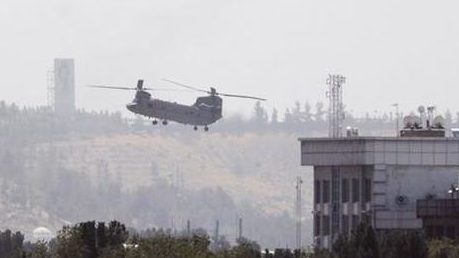Washington Must Learn the Right Lessons from Afghanistan
Historians will spend generations sifting through the rubble of what happened in Afghanistan and why.
After twenty years, tens of trillions of dollars, tens of thousands of American and allies killed and wounded — and countless Afghans — the Taliban in roughly a week retook the country they lost in 2001.
The blame game has already started, but this failure has many causes that date back to the nature and execution of the original mission in the wake of 9/11. What started as a quick, free-wheeling first victory in the war on terror was neglected for nearly a decade before a surge that was intended to put the country on a path to self-reliance.
For many around the world, however, the events of the last week have reinforced the perception that the United States is simply not ready for prime time, whether in launching — and dragging allies into — costly, destabilizing and ultimately pointless wars, embracing questionable financial practices that plunged the world into an economic crisis, or proving unable fight a devastating pandemic that’s killed more 620,000 Americans.
And now, Joe Biden himself is accused even by America’s closest allies for betraying Afghanistan and all those who sacrificed so much for so long. But it wasn’t enough progress soon enough to buy more strategic patience. As UK Defence Secretary Ben Wallace observed last month, twenty years was just not enough time for the magnitude of the mission.
Time will tell whether the decision to withdraw is sound. Where there isn’t debate is that the precipitous withdrawal that so many warned would be problematic has dealt the United States and its allies a stinging black eye. On the 20th anniversary of the 9/11 attacks, the Taliban will be in power just as it was in 2001 — and an inspiration to other Islamic movements for vanquishing America.
The world, rightly, expects the United States to do big things well, whether in crafting strategy, meaningful capabilities, starting wars or ending them.
Yet each of these episodes play into the narrative of American incompetence at the very time the United States is making the case that it’s the partner of choice to rally the world to better stand up to authoritarian regimes like China and Russia.
A nation blessed with abundant wealth and good intentions that come from an optimistic can-do spirit finds itself continually hamstrung by unjustified overconfidence in its abilities, a worrisome propensity to tell itself it’s the best when it clearly isn’t, an unsettling inability to learn from history or its own mistakes, and, worst of all, capable of extraordinary lapses of fundamental judgment — including by leaders regarded as the best, the brightest and the most experienced. It also has a troubling track record of try to solve one problem only to trigger another calamity that also impacts allies.
Long-running wars often end abruptly and chaotically. That no one in the White House foresaw the Taliban surging to power or people falling from the wheel wells of jets as they were taking off from Kabul is either naive, incompetent or both.
You can’t force your ally to free hardened Taliban fighters and cut off their access to intelligence or technical and logistical support and assume things will work out well.
Those in the last four administrations involved in the war must embark on overdue self reflection. This was a self-inflicted wound, an own goal of historic proportions that both parties bear responsibility — and will be remembered as such.
It is a historic fumble that could easily have been avoided as the last two administrations put their haste to exit ahead of all logic and reason. Worse, in the end, poor planning caught the United States flat footed and dependent on the forbearance of the Taliban to safely evacuate Americans, allies and Afghans.
The administration will have to weather the criticism — from adversaries as well as allies — that Joe Biden is reckless and can’t be trusted.
Beijing and Moscow are making the case that if Washington won’t risk its troops in a war that it’s fought for two decades, it may be unlikely to fight bloodier potential battles to defend Taiwan, Japan, Estonia and Poland. It’s not a matter of if, they argue, but when and how America betrays you.
America’s checkered track record over the past two decades is why every US ally is hedging its bets individually to improve capabilities, or collectively, to work more closely together driven by the fear that Washington may flake out or foul up.
Washington’s ability to argue its foreign policy is predicated on the importance of values and human rights have been undermined. In the battle for ideas among great powers, China’s Xi Jinping is far more honest — he doesn’t care about human rights and we all know it. Washington’s focus on human rights, whether in Hong Kong, Xinjiang, Moscow and elsewhere are genuine, but ring more than a little hollow when millions of Afghans — and Afghan women in particular — at best now face religious subjugation.
America and Biden can help their case by ferrying as many of our Afghan allies and their families to safety as possible and investing in their resettlement. It’s the least that the nation can do to thank those who will be marked by their service to the United States and its allies.
The trillions spent in Afghanistan — and Iraq — could have comprehensively modernized the US military to better prepare if for the challenges posed by China and Russia. That sum would have bought the much needed planes and ships as well as offensive and defensive weapons with which to deter two nations that have spent the better part of two decades furiously modernizing themselves.
The best that can be said is that the wars in Afghanistan, Iraq and on terror more broadly propelled the advances in all-source geospatial intelligence, surveillance, unmanned systems, big data, artificial intelligence as well as networked warfare.
As for the future, it remains unclear whether the Taliban will again host international terror groups like al Qaida and if so, whether Afghanistan’s benefactors — China, Russia and Pakistan — will impede America’s freedom of counter-terror maneuver.
Ultimately, the United States is harvesting the bitter fruit for its hubris and lack of strategy. Over time, it came to believe its own lofty rhetoric as achievable goals.
The key now is to quickly learn from these mistakes so America in better stead as the competition with China and Russia intensifies.
But to learn the right lessons demands honesty about the facts of the current situation.
The central lesson two decades after 9/11 that US leaders have yet to learn is that there are no symmetrical ways to fight asymmetrical foes — whether the Taliban, Russia or China.
Time and again America has been confounded by adversaries who simply didn’t fight the way US officials imagined — or would have preferred — they would.
It’s not because the adversaries have it wrong. It’s because American officials are trapped in an outmoded and dangerous mindset — as evidenced by the recent Afghan episode.
Rather than account for every eventuality, Biden and his highly regarded team assumed they would withdraw from Afghanistan as planned in an orderly manner. Afghans would fight for their nation and Washington could move on to focusing on countering China while rebuilding at home.
But there are several glaring flaws with that assumption.
The US-led military effort in Afghanistan was supported by a vast force of civilian contractors from intelligence to flight line maintenance. When America withdrew, so did the contractors, robbing Afghans of the tools they needed to fight on their own. The problem was compounded by forcing Afghanistan to acquire complex US systems that they could not support themselves.
Then there was a persistent challenge of corruption. Too many Afghan leaders accepted Taliban bribes to surrender their forces. That blind spot is emblematic of the problem. Since Trump’s February 2020 withdrawal decision, the Taliban were biding their time and paving the way for demoralized Afghans to fold — whether through money, amnesties or threats — at the times and places of their choosing.
Indeed, the Taliban’s money went a long way because US and international funding for Afghan security forces because corruption kept the money from making it to the troops who hadn’t been paid for months.
What’s desperately needed is greater imagination about what could happen. It was a failure of imagination that failed to stop the 9/11 attacks that precipitated America’s misguided wars.
That said, it’s equally vital to bury the erroneous talking point that because America exited Afghanistan after two decades means it won’t fight for other allies.
Washington has a demonstrated reputation for investing generously in the nations it vanquished. In the wake of the Balkans war, the joke was that the best route to economic renewal as to get bombed by America.
Indeed, time and again, the United States has proven a reliable partner for nations willing to advance their societies and fight to defend themselves — whether Germany, Japan, Italy or Taiwan. America is less inclined to keep fighting for and investing in nations where despite 20 years the rule of law remains elusive, corruption rampant, divisions deep and notion of fighting for your country inconsistent.
Some argue that given more time, Afghanistan — despite not being as homogeneous nor industrialized as Germany or Japan — too would have become a success. But America’s patience ran out. As the old saying goes, we had all the clocks, but the Taliban had all the time.
Within two decades of World War II, Germany and Japan — thanks to generous American investment and hard work — returned to the international community as first-order economic and military powers that were key bulwarks against the Soviet Union.
Now is the time for a much overdue transition to a more judicious, more thoughtful, more nuanced and strategic America. One that understands the scope as well as the limits to its power, the need to more wisely deploy its resources, and to accept — once and for all — that strategy matters.
Pragmatism, time and American power matter, and not every problem is solved through the application of more military power.
Every few years the Afghan mission changed as the United States forced Afghans — no amateurs in the field of warfare — to fight how we wanted them to fight rather than how they were used to fighting.
American power is critical to maintaining a stable rules based order. But leadership carries with it responsibilities. You can’t make decisions that cause even bigger future problems, whether withdrawals that cause even more virulent enemies to take root or trigger humanitarian and migration crises that trigger right wing movements that threaten allied governments.
About time — a decade after Washington concluded that China was its likely adversary, the Pentagon has yet to adapt its strategy to address the capabilities its likely to face, thereby steadily losing its ability to deter Beijing.
Finally, American power too often, America embraces unachievable missions that it wants its military to somehow solve in the face of all reason. Afghanistan was one of those missions.
The United States has gotten away with missteps because it stood tall above all competitors. It also is a nation that for all it’s flaws has uniquely redeeming qualities as the model for other nations to emulate. But it is also a power that faces extraordinary competition from nations that are all to eager to not only point out its mistakes, but also ruthlessly capitalize on them.
Because it doesn’t really matter whether you’re spending $750 billion a year on national security apparatus that you claim is the best in the world when outcomes suggest otherwise. At some point, you either have to change your approach or your level of investment.




